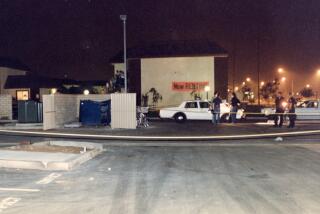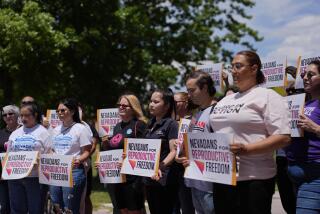Nevada Reaches Out to Assist Mothers Who Abandon Hope
- Share via
LAS VEGAS — On a Monday morning, in the bathroom of her apartment, police say Monique Tucker gave birth to a healthy baby girl, then wrapped her in a plastic grocery bag, placed her in a shoe box and promptly put the baby atop a trash bin behind her complex.
She could have taken the baby to a nearby fire or police station and left her, no questions asked.
But instead, police say, Tucker abandoned the baby on her way to the store to get some sanitary napkins to help stop her bleeding. Tucker said she planned to go back for the baby, but never did.
Tucker, 28, told police a disturbing detail--she knew about Nevada’s safe-haven law for abandoned babies. But prosecutors say she didn’t understand she could leave the baby without getting into trouble.
The baby lived, and now Tucker is charged with attempted murder.
Nevada and 30 other states have passed safe-haven laws that allow mothers to leave their newborns at safe places, such as hospitals and fire and police stations. In most states, the mothers avoid prosecution.
The intention sounds good, but experts question whether the laws are working.
“I think it’s very unlikely,” said Caroline Burry, who teaches child welfare classes at the University of Maryland, and has interviewed several mothers who have abandoned their babies.
Part of the reason might be because legislators in Nevada and other states didn’t include money to publicize the safe-haven law.
The Junior League of Las Vegas, a women’s philanthropic group, helped get the state law passed in May, but received few donations to help let the public know about it.
No babies have been left at safe havens in Nevada since the law passed.
“You can change the law, but that doesn’t change people’s behavior,” said Louise Helton, president of Las Vegas’ Junior League.
The heart-wrenching stories of abandoned babies receive much media attention, but the cases are still rare, Burry said.
The U.S. Department of Health and Human Services estimated that in 1998 there were 105 infants abandoned in public places; 33 of those were found dead. But those figures came from an informal search of newspaper articles on the subject; the federal government doesn’t track the numbers.
On Aug. 6, a maintenance worker found Tucker’s baby atop the trash bin.
A police report says Tucker “had plans to remove the box from the garbage receptacle and take the infant to the hospital or fire department.”
Family and friends say Tucker, who already had three children, denied she was pregnant and even told a neighbor she had stomach cancer. She told police she was “afraid to tell anyone because her husband told her if she had another baby he would leave her.”
Experts in abandoned-baby cases aren’t surprised by Tucker’s actions.
“Here are girls who have hidden the pregnancy for nine months,” said Debbie Magnusen, founder of Project Cuddle, a nationwide program to help women who contemplate discarding their babies.
“It can be a little presumptuous to assume that they will walk into a hospital where there are cameras and security guards.”
Since 1996, the group says, it has rescued 347 babies by counseling frightened women who were considering abandonment.
Burry said although the legislation is good-hearted, “I think it’s important to recognize that it’s not going to affect large numbers, and it doesn’t answer some of the deeper concerns.”
Burry and Magnusen say states should spend money educating women on what to do before they get to the point of abandonment.
“I respect why [the laws are] written but I’m concerned that we need to step back and educate on other alternatives as well,” Magnusen said. “There isn’t just one solution.”
Despite a safe-haven law in Florida, at least 11 babies have been discarded in that state since July 2000. Two babies were found dead.
By contrast, in New Jersey, that state’s law has placed six infants in safe havens since the program’s inception a year ago. State officials attribute the success to an aggressive public awareness and media campaign. New Jersey has spent $500,000 on publicity.
Since news spread of Tucker’s abandoned baby, the Junior League is getting more donations and plans billboards, radio ads, brochures and signs at fire stations and hospitals. Public service announcements are airing on local television stations.
But even with publicity, Burry and Magnusen are skeptical many women will take advantage of the law. Monique Tucker didn’t.
“I’m not sure they’ll reach moms who would unsafely abandon or who really want the baby to die,” Burry said.
More to Read
Sign up for Essential California
The most important California stories and recommendations in your inbox every morning.
You may occasionally receive promotional content from the Los Angeles Times.













